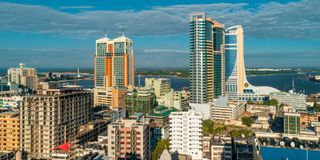Prime
Why Moody’s credit rating upgrade is a big deal for Tanzania

What you need to know:
- The upgrade from of the Government of Tanzania’s long-term issuer ratings to B1 from B2 and a change in the outlook to stable from positive, gives the country a chance to easily and affordably source development financing from international lenders
Dar es Salaam. Tanzania’s rating upgrade by Moody’s is a big deal because it sends a message that the country’s economy was on the right footing, experts say.
The upgrade from of the Government of Tanzania’s long-term issuer ratings to B1 from B2 and a change in the outlook to stable from positive, gives the country a chance to easily and affordably source development financing from international lenders.
“Moody’s is simply sending a message to the international community – which includes the lenders – that Tanzania is financially disciplined,” said economics professor, Semboja Haji.
Moody’s said at the weekend that it was upgrading the Government of Tanzania’s long-term issuer ratings to B1 from B2 and changing the outlook to stable from positive.
“The upgrade to B1 reflects Tanzania’s track record of economic resilience throughout multiple external shocks in recent years, providing confidence in its shock absorption capacity going forward,” Moody’s said.
Tanzania, Moody’s said, is specifically credited for a diversified economic base and exports, stable debt burden and limited contingent liabilities.
As such, Moody’s expect that the country’s continuation of conservative fiscal policy supports the rating at the B1 level.
According to Prof Haji, the rating gives Tanzania another reason to easily and affordably source financing for its development endeavours.
“It means that since, as a country, we use development funds for the intended purpose, then lenders must have faith in us. This is a message to the international community that there is stability, sustainability and predictability in Tanzania’s development strategy,” he said.
In its statement, Moody’s said Tanzania was taking tangible steps to improve institutional strength and foster an improving business environment, although progress remains gradual and in the early stages. Although progress remains gradual and in the early stages, Moody’s says, initial signs of improvements in the business environment were materializing as evidenced through an increase in private sector lending and increasing investment, both foreign and domestic.
The stable outlook, Moody’s says, reflects Tanzania’s track record of economic and fiscal resilience to shocks. While low incomes and high levels of poverty increase exposure to social risks and potential future shocks, Moody’s expects that Tanzania will continue to have a robust and stable GDP growth supported by higher private sector investment and gradually improving competitiveness.
“Ongoing fiscal discipline and declining infrastructure investment (with large public sector-led projects now reaching completion) will support a stable debt burden, while increasing social spending will gradually ease social risks,” Moody’s says.
According to Prof Haji, the rating with testament to the fact that Tanzania was currently being governed in a manner that respects the rule of democracy and that rule of law.
An economist from the Sokoine University of Agriculture, Dr Christopher Magomba, shared similar sentiments.
“It is the same as what happens when a creditworthy person goes to the bank and get a loan without going through tedious procedures,” he said.
The rating, said Dr Magomba, also means that the economy has grown to become so competitive that it can effectively compete with global peers.
“So while this shows the competitiveness of Tanzania’s economy, it is also a wakeup call for our people to start utilizing the opportunities that come with the status,” he said.
Moody’s say the upgrade was underpinned by Tanzania’s economic resilience amid pandemic, inflationary, and global liquidity shocks since 2020.
The country’s real GDP growth averaged 6.0 percent from 2015 to 2022, bolstered by growth across diverse sectors like agriculture, tourism, mining, and construction.
Despite a dip in the tourism sector during the pandemic – a key source of foreign exchange generation – a rise in gold exports partially offset the losses and demonstrate resilience in the export base.
“Exports have rebounded since 2020, driven by a resurgence in tourism, increased gold production, and growth in the agriculture and logistics sectors,” Moody’s says.
Low and stable inflation has been maintained since 2018 as a high share of food consumed is produced domestically and through temporary government subsidies on certain imports, such as fuel, which insulated households from global price shocks.


